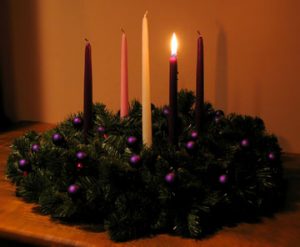
Fr. Smith’s Commentary of the Second Reading
1 Thessalonians 3:12–4:2
First Sunday of Advent
November 27, 2021
Today we celebrate the first Sunday of Advent, the beginning of the Church Year. The most obvious change is that the priest will be wearing purple vestments. A more subtle difference is how the readings for Mass will be chosen. In Ordinary Time, when the liturgical color is green, the Gospel for the year is read somewhat continuously and the first reading is chosen from the Old Testament to complement it. The second reading most often taken from St. Paul is read also semi-contiguously for a few weeks at a time. We have recently examined Romans, 1st Peter, and Hebrews among other writings. In Advent all the readings are chosen to develop the theme of the season. We might better say variations on a theme. Advent means “coming” and we are certainly aware that Christmas is coming. Yet there is another coming that is commemorated as well.
We are told in the general norms for the season:
Advent has a twofold character, for it is a time of preparation for the Solemnities of Christmas, in which the First Coming of the Son of God to humanity is remembered, and likewise a time when, by remembrance of this, minds and hearts are led to look forward to Christ’s Second Coming at the end of time. For these two reasons, Advent is a period of devout and expectant delight.
It is divided into two sections early Advent which extends until December 16 where the emphasis is placed on the return of Jesus and the weekdays from December 17 to December 24 which more directly prepares for the Birth of Jesus. Not only are the readings especially chosen to emphasize these themes but the prayers as well. We will pay closer attention to the second reading in these Advent commentaries but will also note the prayers for the day as well.
The “First letter to the Thessalonians” which we read today is the earliest writing we have for Paul and indeed the entire New Testament. Thessalonica was an important city with a substantial Jewish community which at very least formed the nucleus of this community. Paul’s message as we have seen countless times before was understood by Jews and Gentiles in different ways and there was often confusion, Paul trained leaders to address this, but he was never quite sure how effectively they were able to lead and teach. He wrote this letter after his trusted disciple Timothy returned from a visit. He reported that the church in Thessalonica is thriving, and Paul is sending his compliments. Yet they are still a young community and needed some support and encouragement.
Paul reminds them that Jesus would be returning. This would have had a very precise meaning to faithful Jews which they would have taught to Gentiles as well. For Jews, the Messiah would bring the reign of God into the world. Jesus calls this the kingdom. This would be a complete peace: harmony between humanity and God, humanity itself and humanity and nature. This was a this-worldly event, it was not heaven in full sense of the world. Obviously, the world in which we live is far from heaven.
Paul wants his communities to remember two things about this kingdom.
Christians cannot create this harmony. It is a divine gift. As Jesus initiated the process of the kingdom only he can complete it. Thus, we read that it will be at the coming of our Lord Jesus with all his holy ones. (1 Th 3:13)
The Lord will return at a time and in a manner that he will choose, this is not within our power to know much less accomplish. Yet we are not purely passive. He writes:
Finally, brothers, we earnestly ask and exhort you in the Lord Jesus
that, as you received from us
how you should conduct yourselves to please God
and as you are conducting yourselves
you do so even more.(1 Th 4:1)
We are to show ourselves grateful for the gift of life through Jesus’ death and resurrection and aware of our responsibilities by acting in a way pleasing to God. They are doing so but Paul wishes them to be more aware of why they should do so. The instructions that Paul gave them are not his interpretation of the Law, however profound, but divinely given:
For you know what instructions we gave you through the Lord Jesus.
(1 Th 4:2)
This is the purpose of Advent. With this first coming, Jesus began the establishment of the Kingdom which will be completed with his return. This is not a matter for speculation or the creation of a grand theory but for action: how will we live now? Paul believes that a lively sense of the Lord’s return would be a great help and aid in our effort to build a community here and now.
This is a wonderful opportunity to study and reflect but we in the Catholic church must also celebrate. As I mentioned, the Mass prayers for this season are very powerful. In the opening prayer, the collect, which as the name suggests is to bring us together, we read:
Grant your faithful, we pray, almighty God,
the resolve to run forth to meet your Christ
with righteous deeds at his coming,
so that, gathered at his right hand,
they may be worthy to possess the heavenly Kingdom
Advent is often considered the “lost” season. Misunderstood as merely a preparation for Christmas and drowned out by the veritable orgy of consumption, we can easily forget that it calls us to celebrate that God is always working within us. He is bringing the kingdom to fulfillment in his own time and in his own way. This is beyond our minds to understand but is the reason we have hearts to hope.